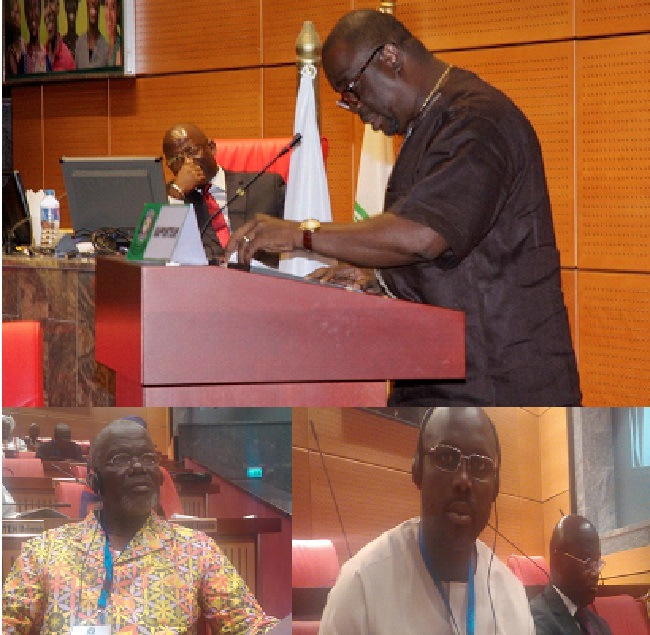‘Liberian economy suffered two major shocks’

Pic caption: Above, Rep. Snowe reads the report as Rep. Karmoh presides (seated); Below (right to left), Senators Weah & Johnson listen during the session
Liberian Representative Edwin Snowe on told fellow West African sub -regional legislators and parliamentarians on Friday that the state of the Liberian economy has experienced two major shocks.
He named them as the outbreak of the Ebola Virus Disease (EVD) and the decline in global commodities particularly, iron ore and rubber.
Rep. Snowne presented the Liberia Country Report during the ongoing 1st Ordinary Session of the Fourth Legislature of the parliament of the Economic Community of West African States (ECOWAS) taking place in Abuja, Nigeria.
“Moreover, the imminent United Nations Mission in Liberia (UNMIL) drawdown in June 2016 as well as the upcoming General and Presidential Elections are posed to present further uncertainty that may have economic, political, social and security risks”, the report reads.
Other Liberian legislators present at the session were Senators George Manneh Weah and Prince Yormie Johnson of Montserrado and Nimba Counties respectively as well as Representative Haja Fata Siryon of Bomi County. All five of Liberia’s representatives were present during the presentation.
Sinoe County Representative Jefferson Karmoh presided over Friday’s session in his capacity as the Third Deputy Speaker of the sub regional parliament. The Session also witnessed the presentations of country reports from the Republics of Benin, Guinea Bissau, Cape Verde and Guinea.
The report, which recalled Liberia’s 13 years of peace and stability since the war ended in 2003, noted that the country continues to enjoy a stable and democratic government following two presidential and legislative elections, including a Special Senatorial Election in 2014.
According to the report, Liberia has made tremendous inroads in the areas of political tolerance, institutional reforms, economic transformation, peace and security, infrastructural developments, human development, regional integration and bilateral relations, among others.
The report: “Transitioning from post-conflict to developing nation and attaining middle-income status requires great deal of political, economic, social and cultural reengineering across the country if the complex challenges of socioeconomic development and transformation in Liberia are to be addressed adequately.”
The Liberian lawmakers in their report stated that in spite of all of these gains, the country is still challenged by what they described as an array of internal and external problems: “For example, there are concerns in several quarters as to whether the national security is up to the task of maintaining peace and order as UNMIL departs. Also, the Liberian economy was hit by the epidemic outbreak and decline in global commodities prices, recovery is a real challenge as there are calls for the diversification of the economy”.
The report noted that despite these challenges, the Liberian Government is committed to employing strategic interventions to address all these pitfalls: “With the help of its international partners and other well-meaning Liberians, and God above all Liberia is posed to prevail in the end.”
The lawmakers’ report recognized the historical facts that led to the transgression of individual rights to civil liberty and fundamental freedom of expression as one of the cardinal causes of the Liberian civil war. They then praised the President Ellen Johnson Sirelaf-led government for managing to delicately deal with the issue of press freedom and basic human rights in a more responsible manner.
The report: “Under the leadership of President Ellen Johnson-Sirleaf, in 2012, Liberia signed the Declaration of the Table Mountain, which aspires for African government to remove criminal defamation laws in the promotion and protection of fundamental press freedom. Following the passage of said Act, as noted by the Freedom House article, the Press Union of Liberia submitted a bill to the Legislature seeking decriminalization of said laws.”
Also in their report, the lawmakers, while admitting to some challenges in the ratification of several protocols including the Community’s Legal Texts and Protocols, promised to make significant progress in that direction.
“Currently there are about 29 Protocols at the Liberian Legislature since two years ago that are yet to be ratified or domesticated. We, however, want to assure this honorable body that by our next session, significant progress would be achieved,” Representative Snowe assured.
The ongoing session is the First Ordinary Session of the Sub-Regional Parliament for 2016. It opened on Monday, May 16, and runs to the last day of the month.
The 115-Member Parliament sits in session three times a year with two ordinary sessions in May and September. There may however be an extraordinary session at any time in the course of the year to discuss an urgent, specific agenda.
Nat Bayjay

